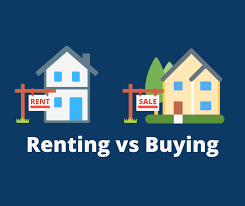Renting vs. Buying a house: Pros and Cons

Renting vs. Buying a house: Pros and Cons
Introduction:
When it comes to encouraging their children to buy a home, Indian parents must be the most vocal. However, in the current environment, it may not be a good idea for millennials to invest in real estate. Before committing to a significant EMI for self-employment, one must evaluate several considerations. It is preferable to rent when you first start working rather than being obligated to a high EMI.
Instead of simply following your parents' recommendations, examine the advantages and disadvantages of renting versus buying.
Choosing whether to continue renting or buy a home is always a difficult decision. It's also true that, due to the high price of owning a home, the vast majority of young people begin their lives as renters. People save money as they progress in their jobs and purchase their first homes. This is the pattern that has been observed.
Choosing whether or not to purchase a home and when to do so is a personal decision. Homeownership in India, on the other hand, is heavily influenced by financial, emotional, and societal forces. Continue reading to learn about the advantages and disadvantages of renting vs. buying a home, as well as which option makes more financial sense.
Renting a home – Advantages
- There is a little more flexibility for that person who is forced to relocate due to their jobs having it easier. There is no long-term commitment, thus it is appropriate.
- You can live in a leased home in a neighborhood where you can't afford to buy a house.
- Moving out is less difficult because there are fewer responsibilities.
- The owner is responsible for all maintenance.
- The insurance that the renter is required to purchase is restricted to comprehensive coverage for the contents of the house.
- A tenant may have money left over at the end of the month that can be put toward a down payment on a home.
- Renting enables investment diversification. Owning a home entails pouring all of your savings into one huge investment, leaving nothing for the rest. This also aids in risk distribution.
- Some utilities may be covered by the rent.
Renting a home – Disadvantages
- The renter has only limited freedom in terms of fully enjoying or exploiting the property.
- The renter is not allowed to make any changes to the property without the owner's permission.
- There is no way to make money and get a return on your investment. He eventually repays the homeowner's loan.
- Rent variations owing to inflation are uncontrollable.
- The rental agreement is not guaranteed to be renewed after it expires.
- When a tenant reaches retirement age and his or her income begins to dwindle, it may become difficult to come up with large sums of money to pay the rent. Rent rises are also becoming increasingly difficult to afford.
- The renter is not obligated to save money. There is always the desire to spend money instead of saving it. Paying down a loan over time helps to develop equity.
Buying a House – Advantages
- It's a method of increasing one's fortune.
- The value of the owned property will rise with time, allowing the owner to benefit if they sell it later.
- Purchasing real estate gives the owner unlimited freedom to utilize and enjoy the land.
- The owner is free to make changes to the property as he or she sees fit.
- The property can be rented out to create revenue for the owner. This money can be used to pay down the purchase loan.
- On-time loan repayments help to boost the borrower's credit profile.
- There is an opportunity to put money aside for the future.
Buying a House – Disadvantages
- Becoming a homeowner entails a significant financial commitment, which includes mortgage and upkeep payments.
- Additional fees that a homeowner must face include taxes and insurance.
- Because of the recession, a homeowner may not be able to resell their home at a profit.
- A homeowner has fewer options than a tenant when it comes to moving out of their current residence.
- There is a deposit to be paid. The purchaser must continue to make the appropriate mortgage payments.
- The buyer must set up an emergency fund to cover any repairs that may arise.
- Even if it is a resale, many of the residences sold are unfurnished.
Conclusion:
As can be seen, there are advantages and disadvantages to renting a place to live versus owning a property. Many people purchase homes when they would be better off renting since owning a property represents a growing investment for them. Others prefer to rent because of the flexibility it provides, even though their net worth would improve if they owned their own home.
When comparing the advantages and cons of renting vs. buying a house, the issue that arises is if buying a house is a good investment. It was also discovered that the average person changes their decision about whether to rent or buy a home every 5 to 7 years. In the end, the votes are for purchasing a home.
Because real estate corresponds to the actual illiquid asset, the bias shifts to buying a house. With the opportunity to build equity and increase the value of your home over time, take advantage of tax benefits, turn your home into a source of income, and integrate yourself into the local community, it pays to take the plunge and buy your own home to give your family and social life more structure. The intangibles include ownership pride and a sense of security.
I hope you found my essay on the 'benefits and cons of renting vs. owning a house' useful.
For more details you can visit to Brickfolio's official website.